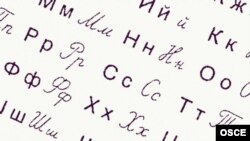Kazakh president orders shift away from Cyrillic alphabet
| Publisher | Radio Free Europe/Radio Liberty |
| Publication Date | 12 April 2017 |
| Cite as | Radio Free Europe/Radio Liberty, Kazakh president orders shift away from Cyrillic alphabet, 12 April 2017, available at: https://www.refworld.org/docid/59818d1aa.html [accessed 28 May 2023] |
| Disclaimer | This is not a UNHCR publication. UNHCR is not responsible for, nor does it necessarily endorse, its content. Any views expressed are solely those of the author or publisher and do not necessarily reflect those of UNHCR, the United Nations or its Member States. |
April 12, 2017 12:32 GMT
By RFE/RL
 In 1929, Soviet authorities replaced traditional Arabic-based alphabets used by Muslim minorities in the Soviet Union with Latin-based national alphabets, which were then replaced in 1940 with Cyrillic – the alphabet used for the Russian language.
In 1929, Soviet authorities replaced traditional Arabic-based alphabets used by Muslim minorities in the Soviet Union with Latin-based national alphabets, which were then replaced in 1940 with Cyrillic – the alphabet used for the Russian language.
Kazakh President Nursultan Nazarbaev has ordered the authorities to come up with a Latin-based alphabet for the Kazakh language by the end of 2017, marking a major shift after nearly 80 years with a Cyrillic-based alphabet.
The order is part of a new "strategic plan" for the Central Asian country that was published in the state-run Egemen Qazaqstan newspaper on April 12.
It appears to be part of efforts to emphasize Kazakh culture while distancing the country from Russia and shedding rules and traditions left over after decades of domination by Moscow.
In the plan, which was published in Kazakh only – not in Russian – Nazarbaev wrote that textbooks in the new Latin-based alphabet must be issued by 2018 and teachers must be trained to use it.
Nazarbaev stressed that his 2012 program for Kazakhstan's development through 2050 envisioned a complete switch to a Latin-based alphabet by 2025.
"That means that by 2025, we must have all official papers, periodicals, books and text-books printed in the Latin-based alphabet," the April 12 statement said.
It said the Cyrillic-based alphabet will be used in parallel with the new alphabet for a "transitional" period.
In 1929, Soviet authorities replaced traditional Arabic-based alphabets used by Muslim minorities in the Soviet Union with Latin-based national alphabets.
In 1940, the Latin alphabet was replaced with Cyrillic – the alphabet used for the Russian language.
Nazarbaev's previous statements on a possible shift to the Latin alphabet have appeared to irk Russia.
In 2006 and 2012, Nazarbaev and his foreign minister, Erlan Idrisov, publicly defended the proposal after it was criticized in Russian media as a geopolitical move.
In January 2013, after discussions of Kazakh-Russian space cooperation with the Russian Foreign Minister Sergei Lavrov in Moscow, Idrisov said that there was "no subtext and no geopolitical signal in Kazakhstan's intention to switch" to a Latin alphabet.
"This is planned work, and we've been speaking about it for a long time," Idrisov said at the time.
Nazarbaev's strategic program also outlines ways to strengthen Kazakhstan's statehood and sovereignty.
Kazakhstan has a sizable ethnic Russian minority, a nearly 7,000-kilometer border with Russia, and close ties with Moscow.
Nazarbaev, who has been in power since before Kazakhstan gained independence in the Soviet collapse of 1991, was one of the founders of the Eurasian Economic Union, a trade grouping of former Soviet republics.
But he has chafed at perceived efforts by Russian President Vladimir Putin to gain political leverage over the oil-and-gas-producing country of 17 million.
Russia's seizure of Crimea from Ukraine in 2014 sparked concerns that Moscow might set its sights on a swath of northern Kazakhstan, along the border with Russia, where the majority of Kazakhstan's Russian-speakers reside.
Link to original story on RFE/RL website
